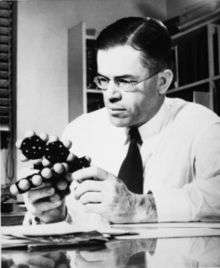Paul Doughty Bartlett
| Paul Doughty Bartlett | |
|---|---|
 Paul Doughty Bartlett | |
| Born |
August 14, 1907 Ann Arbor, Michigan, United States |
| Died | October 11, 1997 (aged 90) |
| Institutions |
Rockefeller Institute, University of Minnesota, Harvard University, Texas Christian University |
| Alma mater | Amherst College, Harvard University |
| Doctoral advisor | James Bryant Conant |
| Doctoral students |
Paul von Ragué Schleyer, James Cullen Martin, Aryeh Frimer |
| Notable awards |
ACS Award in Pure Chemistry (1938) Willard Gibbs Award (1963) National Medal of Science (1968) Welch Award (1981) |
Paul Doughty Bartlett (August 14, 1907 – October 11, 1997) was an American chemist.
Bartlett was born in Ann Arbor, Michigan and grew up in Indianapolis. He received his B.A. from Amherst College in 1928. After his graduation from Harvard with James Bryant Conant, Bartlett worked at the Rockefeller Institute and the University of Minnesota. Most of his career was spent at Harvard. Among other achievements, Bartlett was co-author with Lawrence H. Knox of a classic paper on organic reaction mechanisms.[1][2][3] After his retirement in 1972, he started his second career at Texas Christian University.
He was elected a Fellow of the American Academy of Arts and Sciences in 1946.[4] He was awarded the Willard Gibbs Award in 1963,[5] National Medal of Science in 1968,[6] and the John Price Wetherill Medal in 1970.
References
- ↑ Leon Gortler and Stephen J. Weininger (Summer 2010). "Chemical Relations: William and Lawrence Knox, African American Chemists". Chemical Heritage Magazine.
- ↑ "Knox, William Jacob, Jr. (1904-1995)". BlackPast.org. Retrieved 10 February 2015.
- ↑ Weininger, Stephen. "Perspective: Stumbling Through History: Discovering Unsung African-American Chemists". Science Careers. Science. Retrieved 10 February 2015.
- ↑ "Book of Members, 1780-2010: Chapter B" (PDF). American Academy of Arts and Sciences. Retrieved May 19, 2011.
- ↑ American Chemical Society - Chicago Section
- ↑ National Science Foundation
- F. H. Westheimer (1998). "Paul Doughty Bartlett (14 August 1907-11 October 1997)". Proceedings of the American Philosophical Society. 142 (3): 446–456.
External links
- Oral History interview transcript with Paul Bartlett 18 July 1978, American Institute of Physics, Niels Bohr Library and Archives
- National Academy of Sciences Biographical Memoir